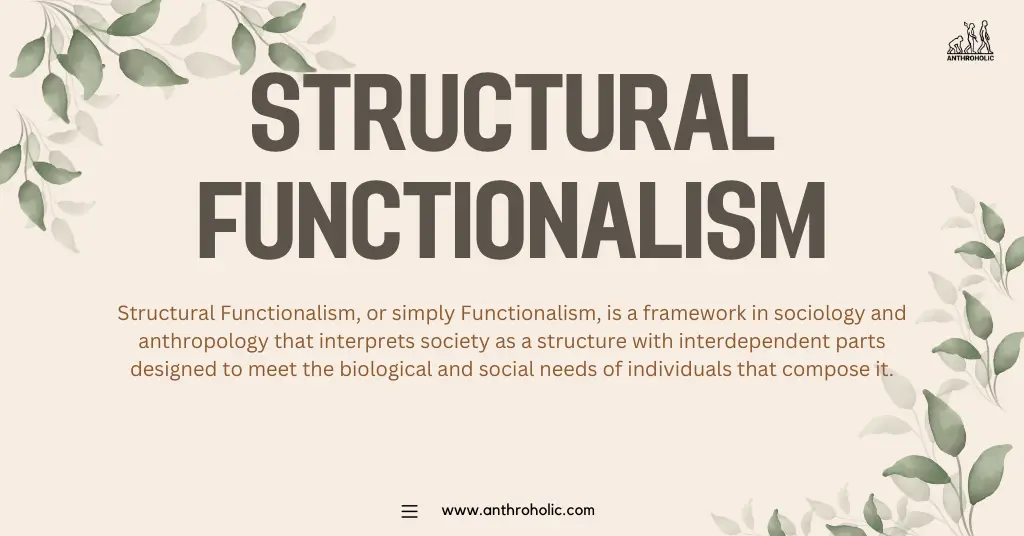AI Answer Evaluation Platform Live Now. Try Free Answer Evaluation Now
Structural Functionalism
Structural Functionalism, is a framework in sociology and anthropology that interprets society as a structure with interdependent parts designed to meet the biological and social needs of individuals that compose it [1]. This viewpoint, significantly influenced by the works of Herbert Spencer, Emile Durkheim, and Talcott Parsons, is instrumental in establishing a comprehensive understanding of complex social phenomena.

Theoretical Foundations of Structural Functionalism
- Herbert Spencer: Often referred to as the ‘second father of sociology’, Spencer introduced the idea of society as an organism with various interconnected parts [2].
- Emile Durkheim: Durkheim emphasized social facts, collective conscience, and functional prerequisites, which greatly contributed to the development of functionalist theory [3].
- Talcott Parsons: Building on Durkheim’s work, Parsons developed a comprehensive theory called ‘the social system’, which became a significant foundation for structural functionalism [4].
Key Concepts of Structural Functionalism
Social Structure
This refers to the patterned social arrangements in society that are both emergent from and determinant of individual actions [5]. They can include:
- Institutions: Schools, governments, churches, and families that provide structure to societal behavior.
- Norms: Unspoken rules that guide behavior.
- Roles: Expectations for the way individuals should act in specific situations.
Function
A function is the contribution made by any constituent part of a system to meet an agreed purpose or to maintain equilibrium within the system [6].
Equilibrium
This principle states that a society strives to maintain stability and order through self-regulating mechanisms [7].
Understanding Society through Structural Functionalism
Table 1. Explaining the functionality of various societal elements:
| Social Structure | Function | Examples |
|---|---|---|
| Family | Socializing children, providing emotional and financial support | Parents teaching values to their children |
| Education | Transferring knowledge and skills, socializing individuals into societal norms | Schools teaching math and history, fostering teamwork through group projects |
| Economy | Producing and distributing goods and services | Businesses creating products, consumers purchasing products |
Criticisms of Structural Functionalism
Despite its influential stance, structural functionalism has received its fair share of critique. Critics argue that:
- Overemphasis on Stability: It tends to overlook societal conflicts, inequalities, and rapid social changes [8].
- Deterministic: It views individuals as passive entities shaped by social forces, diminishing the role of individual agency [9].
- Static Perspective: It may struggle to adequately explain societal change and evolution, focusing more on societal maintenance [10].
The Relevance of Structural Functionalism Today
Despite the evolution of sociological theories over time, structural functionalism remains relevant and continues to provide useful perspectives for analyzing society. It aids in explaining how different societal elements work together to maintain societal order [11]. This perspective can be especially useful when applied to areas such as healthcare, education, and government.
Structural Functionalism in Health
In the field of health, structural functionalism aids in understanding the role of healthcare institutions in maintaining societal well-being. The healthcare system, for instance, contributes to the stability of society by preventing illness and promoting overall health [12].
Structural Functionalism in Education
From a functionalist perspective, education serves several purposes such as teaching knowledge, providing vocational training, and socializing individuals into societal norms. It also plays a critical role in maintaining social order by fostering social cohesion and promoting societal values [13].
Structural Functionalism in Government
Functionalists view government institutions as systems that manage societal components, maintain social order, and mediate conflicts. The smooth functioning of the government helps ensure societal stability and promotes social harmony [14].
The Future of Structural Functionalism
In the future, structural functionalism may evolve to better integrate the role of individual agency and societal change, thus creating a more comprehensive and dynamic framework for understanding society. For instance, neo-functionalism, a recent development, attempts to integrate conflict, change, and functional interdependence into one comprehensive view [15].
It’s also important to recognize that Structural Functionalism, like all theoretical frameworks, should not be used in isolation. A multi-theoretical approach will provide a richer and more comprehensive understanding of the complexities of society.
Conclusion
Despite its criticisms, structural functionalism has contributed immensely to our understanding of society. Its focus on stability and interdependence provides crucial insights into how societies function and maintain equilibrium. However, like all theories, its interpretation should be tempered with a consideration of its limitations, and complemented by other theoretical perspectives for a more holistic understanding of society.
References
[1] Macionis, John, and Linda Gerber. “Sociology”. Pearson Education Canada, 2010.
[2] Turner, Jonathan H. “The Structure of Sociological Theory”. Wadsworth, 2003.
[3] Durkheim, Emile. “The Division of Labor in Society”. Free Press, 1997.
[4] Parsons, Talcott. “The Social System”. Routledge, 2013.
[5] Giddens, Anthony. “The Constitution of Society”. Polity Press, 1984.
[6] Radcliffe-Brown, A.R. “Structure and Function in Primitive Society”. Free Press, 1952.
[7] Merton, Robert K. “Social Theory and Social Structure”. Free Press, 1968.
[8] Collins, Randall. “Conflict Sociology: A Sociological Classic Updated”. Routledge, 2009.
[9] Giddens, Anthony. “Central Problems in Social Theory: Action, Structure, and Contradiction in Social Analysis”. University of California Press, 1979. https://doi.org/10.1177/000271628044800153
[10] Turner, Jonathan H. “Theoretical Sociology: 1830 to the Present”. Sage Publications, 1991.
[11] Giddens, Anthony. “The Constitution of Society”. Polity Press, 1984.
[12] Conrad, Peter, and Kristin Barker. “The Social Construction of Illness: Key Insights and Policy Implications”. Journal of Health and Social Behavior, 2010.
[13] Ballantine, Jeanne H., and Joan Z. Spade. “Schools and Society: A Sociological Approach to Education”. Sage Publications, 2015.
[14] Janowitz, Morris. “The Professional Soldier: A Social and Political Portrait”. Free Press, 1960.
[15] Alexander, Jeffrey C. “Neofunctionalism and After”. Blackwell Publishers, 1998.




